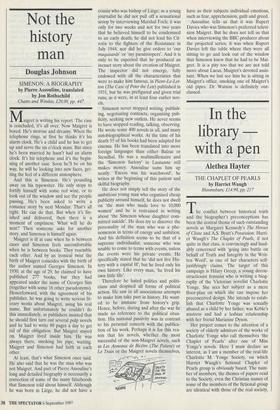Not the history man
Douglas Johnson
SIMENON: A BIOGRAPHY by Pierre Assouline, translated by Jon Rothschild Chatto and Windus, £20.00, pp. 447 Maigret is writing his report. The case is concluded, it's all over. Now Maigret is bored. He's morose and dreamy. When the telephone rings, at first he thinks it's his alarm clock. He's a child and he has to get up and serve the six o'clock mass. But since he's been married he hasn't had an alarm clock. It's his telephone and it's the begin- ning of another case. Soon he'll be on his way, he will be looking into new faces, get- ting the feel of a different atmosphere.
And this is Simenon. He's pounding away on his typewriter. He only stops to fortify himself with some red wine, or to look out of the window and see the people passing. He's been asked to write a romance story by next Monday. That's all right. He can do that. But when it's fin- ished and delivered, then there is a moment of emptiness. What will he do next? Then someone asks for another story, and Simenon is himself again.
Maigret is ill at ease when he is between cases and Simenon feels uncomfortable when he is between books. They resemble each other. And by an ironical twist the birth of Maigret coincides with the birth of the author named Georges Simenon. In 1930, at the age of 29, he claimed to have published 277 books, but they had appeared under the name of Georges Sim (together with some 16 other pseudonyms). Henceforward, with the agreement of his publisher, he was going to write serious lit- erary works about Maigret, using his real name. But unfortunately he couldn't do this immediately, as publishers insisted that he should first turn out several pulp novels and he had to write 80 pages a day to get rid of this obligation. But Maigret stayed on. Maigret lived inside him. He was always there, smoking his pipe, waiting. Maigret and Simenon had faith in each other.
At least, that's what Simenon once said. He also said that he was the man who was not Maigret. And part of Pierre Assouline's long and detailed biography is necessarily a correction of some of the many falsehoods that Simenon told about himself. Although he was born in Liege, he did not have a cousin who was bishop of Liege; as a young journalist he did not pull off a sensational scoop by interviewing Marshal Foch; it was only for two weeks and not for two years that he believed himself to be condemned to an early death; he did not lend his Cit- roen to the fighters of the Resistance in July 1944, nor did he give orders to 'our maquisards' or 'my paratroopers'. And it is only to be expected that he produced an inexact story about the creation of Maigret. The inspector did not emerge, fully endowed with all the characteristics that were to make him famous, in Pietre-Le-Let- ton (The Case of Peter the Lett) published in 1931, but he was prefigured and given trial runs, as it were, in at least four earlier nov- els.
Simenon never stopped writing, publish- ing, negotiating contracts, organising pub- licity, seeking new outlets. He never seems to have stopped reading, talking, observing. He wrote some 400 novels in all, and many autobiographical works. At the time of his death 55 of his books had been adapted for cinema. He has been translated into more foreign languages than either Balzac or Stendhal. He was a multimillionaire and the `Simenon factory' in Lausanne still makes money. Assouline sums him up neatly. 'Excess was his watchword', he writes at the beginning of this patient and skilful biography.
He does not simply tell the story of the ambitious young man who organised cheap publicity around himself, he does not dwell on 'the man who made love to 10,000 women' and he is restrained in writing about 'the Simenon whose daughter com- mitted suicide'. He does try to discover the personality of the man who was a phe- nomenon in terms of energy and ambition. And his definition seems to be that of a supreme individualist, someone who was unable to come to terms with events, unless the events were his private events. He specifically stated that he 'did not live His- tory with a capital H', but he lived only his own history. Like every man, 'he lived his own little life'.
Therefore he hated politics and politi- cians and despised all forms of political action. He saw in all associations attempts to make him take part in history. He want- ed to be immune from history's grip. Hence, before, during and after the war he made no reference to the political situa- tion. His national passivity was in contrast to his personal concern with the publica- tion of his work. Perhaps it is for this rea- son that his novels, whether the most successful of the non-Maigret novels, such as Les Anneaux de Bicetre (The Patient) or Le Train or the Maigret novels themselves, have as their subjects individual emotions, such as fear, apprehension, guilt and greed.
Assouline tells us that it was Rupert Davies who was Simenon's preferred televi- sion Maigret. But he does not tell us that when interviewing the BBC producer about the projected series, it was when Rupert Davies left the table where they were all sitting to go and look out of the window that Simenon knew that he had to be Mai- gret. It is a pity too that we are not told more about Lucas, Maigret's devoted assis- tant. When we last see him he is sitting in Maigret's office, smoking one of Maigret's old pipes. Dr Watson is definitely out- classed.


























































 Previous page
Previous page